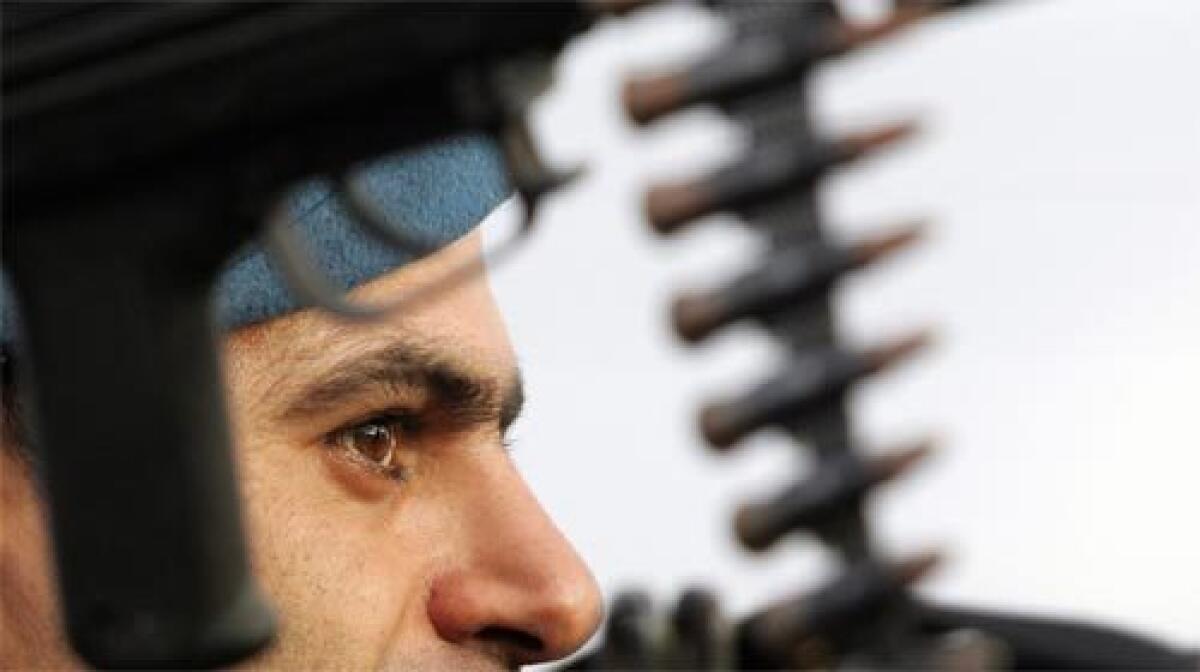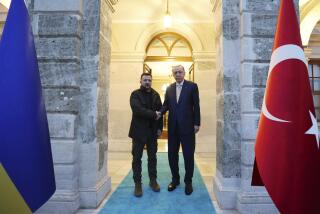In Turkey, pressure builds to attack Iraq

- Share via
ISTANBUL, TURKEY — The Turkish government is coming under enormous domestic pressure to crush Kurdish rebels in northern Iraq, but even as rebel positions are shelled and tens of thousands of troops moved to the border, leaders are reluctant to invade, fearing international isolation and a military quagmire.
Turkish Prime Minister Recep Tayyip Erdogan would prefer to avoid a full-scale invasion, according to people familiar with his thinking, and is pursuing diplomatic options. His government is also considering using economic leverage by rerouting valuable trade away from Iraq’s semiautonomous Kurdistan region, where the Turkish Kurd rebels have found safe harbor.
On Friday, Turkey warned that its “patience has run out” and demanded that Iraq extradite rebel leaders.
Erdogan and his government want to show they are exhausting diplomatic options while waving the military threat, the sources say, because they expect international scorn if Turkey is seen as having opened a battlefront in the only relatively peaceful part of Iraq.
“You can lessen the public pressure with an all-out invasion, but it would be a short-term gain,” Turkish military expert Lale Sariibrahimoglu said. “The government and the armed forces are well aware of the repercussions. This is a serious test of democracy and diplomacy.”
Gen. Yasar Buyukanit, Turkey’s top military commander, was quoted Friday by private broadcaster NTV as saying that the government would wait until Erdogan returns from a Nov. 5 visit with President Bush before deciding whether to launch a military offensive into Iraq.
An invasion also risks dragging Turkey into a quagmire that would play into the hands of Turkish nationalists keen to undermine the pro-Islamic government. Some of the loudest war drums are being beaten by extreme nationalists with a certain sway in parliament and who would no doubt raise their voices further if a military effort proved ineffective.
And experience makes it clear that swift success is by no means guaranteed.
The separatist Kurdistan Workers Party, or PKK, survived repeated attacks by Turkey in the 1990s, its members hiding safely in the rugged mountain terrain on the Iraqi side of the border. And with winter coming, the chances of a decisive Turkish victory are even bleaker.
For days, tens of thousands of Turkish troops have been massing along the 200-mile southern border with Iraq, and commandos have entered several miles into Iraq in hot pursuit of rebels. Combat helicopters and F-16 fighter planes daily attack suspected guerrilla hide-outs and escape routes.
At the same time, Turkey is feverishly pursuing diplomatic solutions, looking especially to Baghdad and Washington to uproot the PKK and stop its violence. The Turkish foreign minister rushed to Baghdad; an Iraqi delegation arrived in Ankara, the Turkish capital, on Thursday for crisis talks that were to continue today; and U.S. Secretary of State Condoleezza Rice is to visit Turkey next week.
In a TV interview Friday, Massoud Barzani, president of Iraq’s Kurdistan regional government, accused Turkey of seeking a pretext to mount a major assault in the area. “The PKK is a justification,” Barzani told Al Arabiya satellite channel. “The goal is to stop or hamper the growth of Kurdistan region.”
The latest Turkish military action is in response to an ambush Sunday in which the PKK killed 12 soldiers and captured eight in southern Turkey, about three miles from the border with Iraq. But hostilities along the remote border have been building for months.
Each day since the ambush, thousands of Turks have taken to the streets across the nation to demand tough military action. The clamor became so intense that the government attempted to restrict television coverage of the soldiers’ funerals and crying mothers.
And Friday, mosques were instructed to read a sermon calling for brotherhood and discouraging citizens from disunity.
The public outcry almost always goes hand in hand with a pitched fury of anti-U.S. sentiments; many Turks are convinced that America is aiding the PKK, or at the least turning a blind eye to rebel activities -- charges Washington denies.
The U.S. maintains that its troops in Iraq are already stretched thin and cannot sustain a significant presence in largely peaceful Iraqi Kurdistan. U.S. officials are demanding that Iraqi authorities crack down on the PKK, but the Iraqis have not done so.
On Friday, Army Maj. Gen. Benjamin Mixon, the commander of U.S. forces in northern Iraq, said he planned to do “absolutely nothing” to counter PKK activity, and that he was neither tracking the rebels’ movements nor reinforcing the military presence in the region. Mixon, speaking to Pentagon reporters by videoconference, also said he had not seen Iraqi Kurdish authorities acting against the guerrillas.
In Istanbul’s Taksim Square, the heart of the city, police braced for more demonstrations as passersby vented their anger and vendors sold huge Turkish flags.
Ahmed Keskin, 60, said war was necessary to put an end to the “humiliation” that Turks were suffering at the hands of the Kurdish rebels.
“And I’d go straight to northern Iraq, kill the Americans there and then kill Kurds wherever I find them,” said Keskin, who makes a living taking photographs of tourists.
In less dramatic terms, Murat Ayan, a recent college graduate looking for a job in the business world, also advocated robust military action regardless of the consequences.
“As long as we solve the problem, it does not matter what we sacrifice,” Ayan, 22, said when asked about the possible blood bath that would accompany an invasion. “We always talk about entering northern Iraq. If you talk about it, you have to show it, you have to show your power.”
That is the kind of public pressure Erdogan faces. Weighing against it, in addition to the expected political and diplomatic fallout, are the lessons of the past.
In two dozen previous incursions in the last decade or so, including a massive operation in 1995, the Turkish army, the North Atlantic Treaty Organization’s second largest, was not able to destroy the PKK. The guerrillas are intimately familiar with the forbidding mountains where they are based, a roadless swath of hidden caves and hard-to-detect, rudimentary camps.
The PKK is believed to have about 3,500 to 5,000 fighters grouped roughly 15 to 20 miles inside northern Iraq, according to intelligence sources. It is a largely lawless region that even Kurdistan regional officials say they have no control over.
After years of guerrilla strikes into Turkey, the PKK has developed as a highly mobile mini-army with expertise in explosives, especially roadside bombs.
Because the pinpoint strikes have not eliminated the rebels, Turkey is considering, among various military options, setting up a buffer zone up to 30 miles deep.
That suggests a different dilemma, according to Cengiz Candar, a leading commentator on Middle East affairs. Turkish forces, he said, would have to in effect occupy the zone much as Israel occupied southern Lebanon for nearly 20 years in an ultimately unsuccessful attempt to destroy the Hezbollah militant group.
And then there’s the approaching winter. Some of the mountains where the PKK is based are already dusted with snow, and much of the area will be impassable within a month’s time.
The recent violence quickly inflamed tensions between ethnic Turks and Kurds, a long-repressed minority in Turkey. There have been several attempts to attack offices of Kurdish political parties.
The government in recent years took a number of limited steps aimed at giving Kurds some political and cultural freedom, such as allowing the use of the Kurdish language in television broadcasts. Giving Kurds more rights could deprive the PKK of one of its key reasons for fighting. But the “Kurdish question,” as it is often called here, remains remarkably emotional and gut-wrenching.
Many Turks regard Kurds with suspicion and even racism, unwilling to show tolerance for expressions of cultural difference. The reasons for this are rooted in history and the creation of the Turkish state early in the 20th century.
The modern Turkish state was created from the ruins of the once-mighty Ottoman Empire after its defeat in World War I. Its founder, Mustafa Kemal Ataturk, fended off attempts by Western powers to further chop it into pieces, and pulled together its diverse peoples into what he envisioned as a single Turkish identity.
For the new Turkey to survive, modernize and prosper, Ataturk ordered, ethnic differences had to be suppressed in the interest of national unity. To this day, Turkish children aren’t taught about the messy backdrop to their country’s creation.
“There is a deep, deep fear among many Turks that more rights for the Kurds means the disintegration of the nation,” Sariibrahimoglu, the military analyst, said.
It is this same visceral context that makes discussion of the World War I-era Armenian genocide, and even Turkey’s more recent invasion of Cyprus, such an emotionally fraught matter.
At a certain point, of course, if it quacks and waddles, it’s a duck. So, even if Turkey refrains from a massive invasion and merely continues with the current cross-border raids and shelling, a war of sorts is already being fought, the repercussions already unleashed. Those include the fraying of Turkish-U.S. relations and delaying of democratic reform inside Turkey.
In predominantly Kurdish southeastern Turkey, most residents regard with dread the prospect of a war. It is there that civilians suffered the most during previous offensives, with tens of thousands killed or displaced.
“If there is war, what am I going to do with my children? How can I leave them, how can I take them?” said Akide Soz, 35, a Turkish Kurd in the southern village of Kurubas, a collection of dirt roads where chickens peck.
Soz has five children, the eldest 7. Wearing billowing paisley pants, a head scarf and golden hoop earrings, she bemoaned especially that Muslims would be forced to kill one another.
“What,” she asked, “is the future?”
Times staff writers Julian E. Barnes at the Pentagon and Ned Parker in Baghdad contributed to this report.
More to Read
Sign up for Essential California
The most important California stories and recommendations in your inbox every morning.
You may occasionally receive promotional content from the Los Angeles Times.







